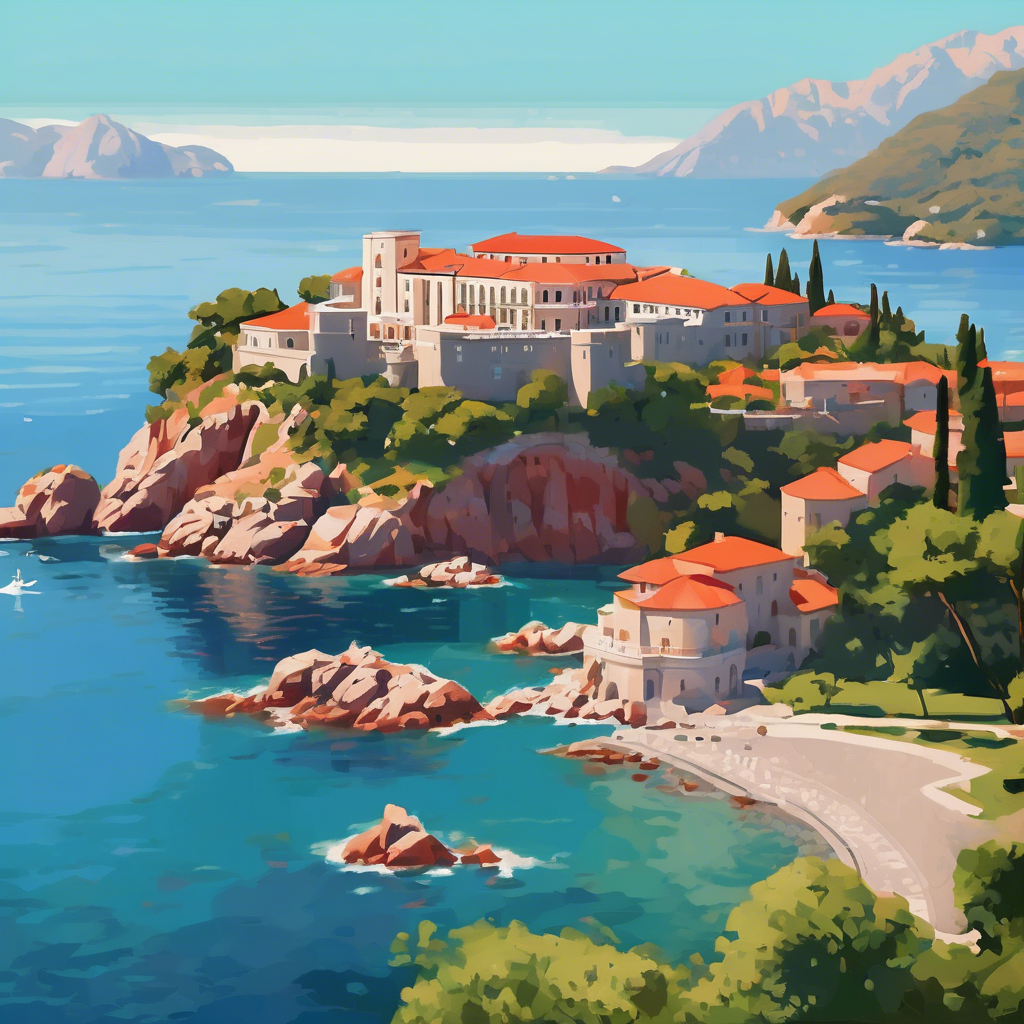
Novak Djoković, the most successful tennis player in the history of the sport, is stepping beyond the tennis court to tackle a pressing challenge in Montenegro—the reopening of the iconic Sveti Stefan city-hotel, which has been closed since 2021. This beloved hotel, nestled on a picturesque islet connected to the mainland by a narrow sandbar, is not just a luxurious retreat but a cultural landmark steeped in history. Djoković’s involvement highlights how sports figures can influence broader social and economic concerns, utilizing their global platform to advocate for solutions that transcend their profesional realms.
After his recent discussions with Montenegro’s Prime Minister Milojko Spajić, Djoković revealed that his visit was driven primarily by a commitment to resolve the ongoing situation surrounding Sveti Stefan. Serving as the global ambassador for the Aman hotel group, which manages the property, he expressed his determination to leverage his name and influence to facilitate dialogue and find a mutually acceptable resolution between the involved parties. Djoković stressed that he is not siding with any faction but is motivated by a genuine desire to protect Montenegro’s interests and preserve the cultural heritage represented by Aman’s presence in the country.
The conflict at the heart of Sveti Stefan’s closure is complex, deeply entwined with lease agreements and legal disputes that stretch back to the early 2000s. Originally leased by the Montenegrin government for 30 years starting in 2007, the property—and associated developments like the Kraljičina Plaža hotel—have seen extended and amended contracts, involving stringent conditions such as a guaranteed annual rent and significant reconstruction investments. However, disputes over public access, property use, and contract adherence have prompted litigation and arbitration cases, including actions taken in London’s International Arbitration Court. These disputes have only intensified since 2021, leading to a stalemate whereby the hotel remains closed, construction halted, and financial strains mounting for both the lessors and the government.
At the crux of these legal battles is the controversy surrounding Kraljičina Plaža, a beach formerly closed off to the public but now opened through the removal of fencing by local authorities. The unraveling of exclusive access, once reserved for political elites and hotel guests, sparked protests and legal reprisals, culminating in lawsuits filed by Sveti Stefan Hotels and the Ministry of Economic Development against Adriatic Properties and Aman, and counterclaims demanding massive compensation. In this saga, Djoković’s role becomes even more significant as he seeks to mediate between conflicting interests—the need for transparency, public accessibility, hospitality standards, and contractual obligations all intertwine in this uniquely Montenegrin dispute.
Djoković’s personal connection to Sveti Stefan lends a poignant dimension to his involvement. Having married on the island in 2014, the hotel holds sentimental value for him as a place tied to his happiest memories in Montenegro. His emotional investment is clear; seeing the site closed and embroiled in ongoing wrangling for years is something he deeply wishes to change. Since becoming Aman’s ambassador in August, he has immersed himself in understanding the broader socio-economic impact of Aman’s operations in the region. He noted that Aman’s arrival in Montenegro dates back to 2006 and has spurred substantial foreign investment, supporting large regional projects such as Luštica Bay, Porto Montenegro, and Portonovi. The loss of Aman would be a major blow to Montenegro’s growing luxury tourism sector and its global reputation.
The dispute’s financial implications have also had ripple effects. Adriatic Properties, led by Greek businessman Petros Stathis, has withheld rent payments worth hundreds of thousands of euros quarterly to Montenegro’s government-owned companies, exacerbating tensions and creating a cycle of economic difficulties. Such fiscal strains threaten the viability of these historical properties and complicate efforts to reach a peaceful resolution. Djoković’s diplomatic overture could well be the catalyst needed to untangle the web of litigation, administrative hurdles, and economic impasse that have held Sveti Stefan and its related resorts captive for nearly four years.
In a broader context, the Sveti Stefan saga is a microcosm of how luxury tourism development, heritage conservation, and local community interests can clash in regions with valuable but delicate ecosystems and histories. The Adriatic coastline, where Sveti Stefan resides, is famous not just for its beauty but also for its complex political and cultural legacies. The integration of global brands like Aman reveals the challenges and opportunities faced by emerging tourist destinations striving to balance authenticity with modern luxury standards. As Djoković champions a solution, he embodies a modern renaissance athlete—one who isn’t just a master on the courts but also an advocate for cultural preservation, local economies, and international cooperation.
With the main arbitration hearing scheduled for May in London and ongoing court rulings, the eyes of Montenegro and the global tourism community remain fixed on the outcome. Djoković’s involvement might prove pivotal in breaking the deadlock, ensuring that Sveti Stefan reopens to guests while addressing public access concerns. More than a sporting icon, Djoković has become a figure of hope for a storied destination, symbolizing the power of individual influence in resolving intricate disputes. Should the resolution come to fruition, it will mark not only a revival for a historic hotel but a reaffirmation of Montenegro’s commitment to blending its rich heritage with future prosperity.
#NovakDjokovic #SvetiStefan #Montenegro #LuxuryTourism #AmanHotels #TennisChampion #CulturalHeritage
Leave a Reply